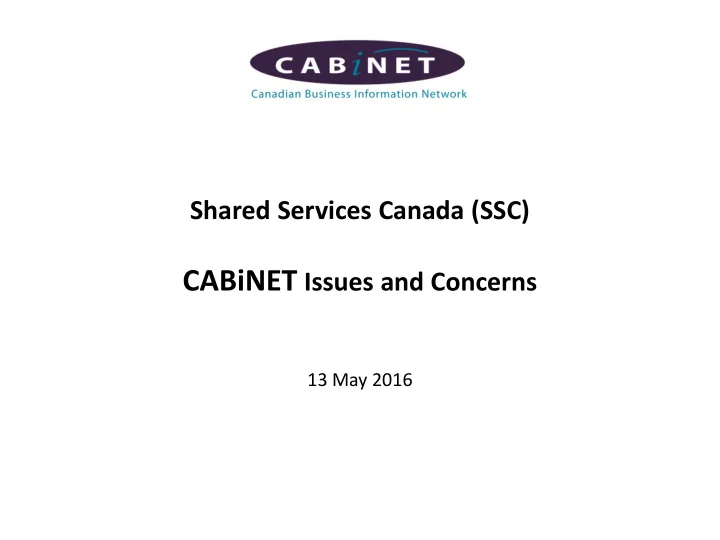

Shared Services Canada (SSC) CABiNET Issues and Concerns 13 May 2016
Topics • Structure of Procurements • Managed Services Contracts • Professional Services Market • Corporate References • SMEs as Subcontractors • Response From SSC 2
Background • CABiNet has raised important procurement issues on a number of occasions. • Written requests for response from SSC have been ignored. • No response received to date from SSC. • Input to Industry Engagement Days have not been helpful. • We are now requesting a formal response to the issues raised. 3
Structure of Procurements • Avoid inappropriate bundling of products and services. • Avoid "monopoly" models. • Structure procurements to promote initial and ongoing competition. 4
Bundled Contracts vs PMO Model • “Bundled" contracts involving hardware/software/telecom services with project management and professional services is a bad idea. • In particular, bundling products and services available from only a small number of vendors along with professional services is a bad practice. • The main result is reduced competition and increased costs to the taxpayers. • The GC track record with large bundled projects is abysmal. 5
Bundled Contracts vs PMO Model (continued) • The latest example is the ETI project, which is very late and has been widely criticized. • Shared Services has no ability to control the ETI project after the contract was awarded. • CABiNET has long advocated a model based on a "Project Management Office" which would manage the project independently of the suppliers which implement the project. • The PMO approach allows the project to proceed based on "chewable chunks" in which Shared Services retains control over the project. 6
"Managed Services" Contracts • "Managed services" contracts are also a very bad idea. • It is impossible to write into a contract all of the services that would be required over a period of five or more years. • The vendor can easily take advantage of this by taking the position that "new work" not specifically identified in the contract requires "new money" and a contract amendment. 7
“Managed Services” Contracts (continued) • This can defeat any potential benefits of "managed services" contracts. For vendors they can be a license to print money. • PWGSC had experience with a large "managed service" contract when CGI was awarded the ETS contract worth up to $400 million in 2007. • The PWGSC managers involved hated that contract, and could not wait to terminate it as soon as they could. 8
Avoid the ‘Obamacare’ Procurement Approach The Obamacare website model: • Select a single large supplier based on "Corporate References" and marketing claims. • Watch helplessly as costs increase (from $93 million to $196 million and then to $292 million). • Watch helplessly as major functional components are not provided on time. • Face public embarrassment for a disaster. 9
Professional Services Market • There is a large and highly competitive market for professional services in Canada (200 companies in Ottawa alone). • This market provides excellent value to the taxpayers. • Excluding these SME companies from competing for SSC projects ensures far higher costs to the taxpayers. 10
Supply Chain • The Professional Services marketplace represents an important part of the Supply Chain of skilled resources which provide services to the GC. • This Supply Chain includes SMEs and many of the most skilled technical resources in the NCR. • SMEs have traditionally provided about 70% of the IT services required by the GC. • There is no reason that the creation of SSC should have a significant impact on market share for the SMEs. 11
Reasonable and Applicable Corporate References • SSC should avoid arbitrary and unreasonably large "corporate references" that eliminate most competition. • Allow a transparent review of corporate references for major procurements with this committee before the solicitations are issued. • Experience working with current partner departments would be far more valuable as a reference to SSC than just being "large". • Select corporate references to maximize competition . 12
Corporate References • Corporate references used by SSC have had a negative impact on the marketplace for IT professional services. • The corporate references are often arbitrary, random, and demanding. • The overall result has been to harm the competitive marketplace and to give an unfair advantage to larger (often US-based) companies and disadvantage smaller Ottawa-based companies. • Corporate references provided from outside Ottawa are very difficult to validate. • US-based companies never bring staff with them; they just recruit resources already in Ottawa. What value do unreasonably large corporate references bring? 13
Allow SMEs to Combine Experience for References • CABiNET is asking for a general policy to allow SMEs to combine their experience to meet "corporate requirements". • This is simple common sense to increase competition and lower costs to the taxpayers. • There would be no negative impact from such a policy. 14
SMEs as Subcontractors • The idea that encouraging larger companies to make use of SMEs as an alternative to open procurements is very misguided. • This approach would implement a process which is not open and transparent for awarding SSC opportunities to SMEs. • Any such commitments by large companies to award business to SMEs are completely unenforceable. • The only individual that could possibly enforce such a commitment is the Minister, and it is not clear that the Minister would do so. 15
The Main Issues • Is SSC going to structure procurements to allow SMEs to compete directly? • Will SSC provide a written response to the issues raised in this presentation? 16
Recommend
More recommend